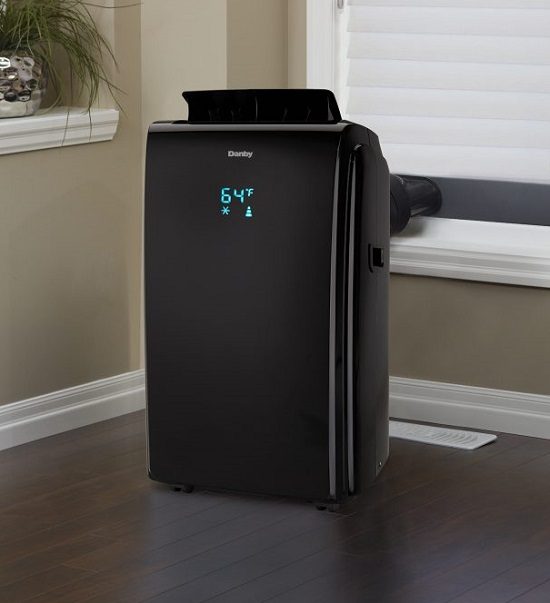There’s a lot to consider when you’re trying to select the best air conditioner for your home. We’ve put together an air conditioner buyer’s guide that breaks down the installation and maintenance requirements, cooling capacity, sizing, noise, and efficiency ratings of various air conditioner models.
Types of Air Conditioning Units
Central air conditioners use a system of air ducts to draw warm air out of the living space, cool the air, and then re-distribute it throughout the home. The most common type of central air conditioners are split systems that include an indoor evaporator unit and an outdoor condenser coil.
Room air conditioners are designed to cool the air in a specific area, like a single room or a garage. These units remove warm air from the space and return cooler, drier air.
The two main types of room air conditioners are portable air conditioners and window air conditioning units. A portable air conditioner sits on castors so that you can roll it from room to room. Window air conditioners are mounted to single or double-hung windows. While window air conditioning units aren’t as portable as those that sit on wheels, it is possible to move window units from one room to another.
Installation
Central air offers a lot of convenience: you can cool the entire house at once and adjust the temperature using a thermostat. However, central air conditioner units require professional installation, and the costs rise even higher if you don’t already have ducts in place.
Room air conditioners are a great option for families who live in condos, apartment buildings, or homes without ductwork. All you need to install a window air conditioner are tools that most people already have at home. Portable air conditioners come with a lightweight, flexible exhaust hose that can easily be mounted in most windows with no tools required.
Cooling Requirements
Need to keep the entire house at an even temperature? Central air conditioning is the solution. But if you spend most of your time in a few select rooms, room air conditioners are the convenient and cost-effective choice.
Size
When the temperature skyrockets, you might be tempted to bring home the most powerful air conditioning unit on the market. However, the biggest air conditioner is not always the best one to buy.
An air conditioner’s cooling capacity is measured in British Thermal Units or BTUs per hour. As a rule, it takes about 20 BTU/h of cooling capacity to cool each square inch of living space. Take a look at our sizing guides for portable air conditioners and window air conditioners for more information.
So, why not install the highest-BTU air conditioner you can find? If an air conditioner is too large, the unit will cool the air before the system has had a chance to de-humidify it, resulting in a room that is damp, cold, and downright uncomfortable.
In the case of central air conditioners, a heating, ventilation and air conditioning technician can calculate your home’s total cooling load to determine what size unit to install.
Maintenance
Central air conditioning is a complex system that demands some serious upkeep. Homeowners have to change the filter twice per summer, schedule regular service calls, and have the air ducts cleaned at least once every few years. For some, it’s a small price to pay for consistent, whole-home cooling.
Room air conditioners, in contrast, are fairly low-maintenance. Both portable air conditioners and window air conditioner units have reusable filters that require a seasonal cleaning, but this can be done with a sink and a bit of soap. With portable air conditioners, it is necessary to empty the condensation bucket when it gets full.
Efficiency
Whether you go with central air or a room air conditioner, choosing an energy-efficient model will help keep cooling costs down. Here in Canada, any air conditioner with ENERGY STAR® certification is proven to exceed the government’s minimum efficiency standards by at least 10%. Central air conditioners also have an EnerGuide label, which lets you compare a unit’s efficiency to that of other models in the same category.
If you want to hone in on the best air conditioner to buy in terms of efficiency, look at the EER and SEER ratings. The Energy Efficiency Ratio (EER) measures how much cooling effect the unit provides for each unit of energy it consumes. Seasonal Energy Efficiency Ratio (SEER) tells you the unit’s efficiency over an entire cooling season.
Not yet following us on social media? Check us out on Facebook, Twitter, Instagram, Pinterest and LinkedIn, or subscribe to our YouTube channel!

 English (CA)
English (CA) English (USA)
English (USA) English (UK)
English (UK) Spanish (MX)
Spanish (MX)








